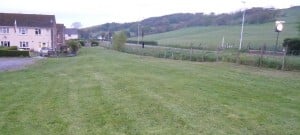Support us from £3/month
We deal with almost 1000 cases a year assisting communities, groups and individuals in protecting their local spaces and paths in all parts of England and Wales. Can you help us by joining as a member?
The Welsh Government has decided not to ape England’s village-greens law.
In December 2013 we learnt that the Welsh Government was proposing, in its Planning (Wales) Bill, to copy the provisions of England’s egregious Growth and Infrastructure Act 2013 for greens. In other words, it proposed that applications for greens should be outlawed when land had been identified for planning, even though that process was often secret and people could not have known their much-loved green spaces were threatened. We said that these proposals struck at the heart of local communities, preventing them from securing the land they have long enjoyed.

A new village green at Tal-y-bont, Ceredigion which could not have been registered under the new Planning Bill
We swung into action, urging our members in Wales to tell us of greens which would not have been registered under the new law and to contact their Assembly Members. We responded robustly to the draft planning bill in February 2014, presenting our alternative measures for clarifying and streamlining the greens-registration process. We wrote to the minister Carl Sargeant, whom our local correspondent Jay Kynch met at a cross-party meeting on rural affairs, and we asked him for a meeting.
At the end of April there was a debate in the Senedd on village greens, promoted by Suzy Davies, Conservative Assembly Member (AM) for South Wales West and Shadow Minister for Welsh Culture, Language and Tourism. We were delighted with the cross-party support for protecting greens, expressed in the debate.
Shortly after this our case officer, Nicola Hodgson, met Carl Sargeant and his officials and put our arguments, explaining that greens were not preventing development and that green spaces were immensely important to local people. Carl Sargeant claimed that he had examples of cases where applications for greens registration were preventing development. Nicola asked for these, and she subsequently was able to show that they were spurious, the information was inaccurate and greens were not getting in the way of development. She went to a further meeting with the officials in July.
Published
In October 2014 the Planning Bill was published; disappointingly it was similar to the draft. Although we had countered the so-called evidence that greens were preventing development, the minister appeared to have ignored our arguments.
The bill was then referred to the Environment and Sustainability Committee, before which we gave oral evidence in December. We were delighted that the three amendments which the committee recommended to the Welsh Government were similar to those we put forward in our evidence.
The first recommendation was to remove the ‘trigger’ events from the Bill. The proposed ‘triggers’ would prohibit village green applications where land was identified for development, including in draft plans, even before the public had the opportunity to comment on the draft.
The second recommendation was to remove from the Bill a provision which would reduce the period within which a town or village green application could be made, after use was challenged, from two years to one year. The committee recognised that the public needed two years in which to gather the necessary evidence of use and submit an application for registration of land as a green.
The third recommendation was to remove from the Bill a provision for fees to be set for applications to amend the town and village green register.
Accepted
The minister accepted most of these amendments, and the Planning (Wales) Act has been passed. It is much better than the bill.
Now applications for village greens will only be prevented if planning permission has been granted on the land or it is subject to a local development order or a development consent order. These are all public processes so people will know that their land is under threat before the threat is realised. Also, the act allows two years for an application for a green after use is challenged, not one.
The pressures for development in Wales are as strong as in England, and we are delighted to have been able to secure a much improved piece of legislation. We are grateful to the Assembly Members who supported us and to our members who lobbied for this.
If only the Westminster Government was so enlightened!
